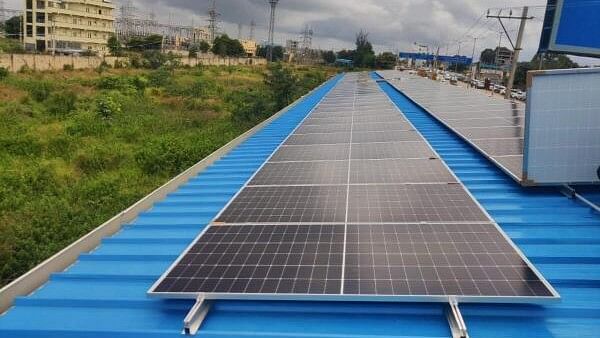
Solar panels over the EV-charging station near the KIA.
Credit: Special Arrangement
India's first second-life battery-powered solar EV charging station, built approximately 1.5km from the Kempegowda International Airport, will start functioning by the end of October, a well-placed Bescom source confirmed to DH.
The private-public partnership between Bescom and GIZ, a German-based company, is set to cater to over 1,000 EV vehicles every day, including 175 EV taxis introduced by the Kempegowda International Airport.
Second-life batteries are those that have already completed a five-year life cycle. But the batteries are good for charging and using for five more years. The project aims at avoiding disposal of used batteries and cutting costs, said the Bescom source.
The facility is spread across 70 meters and 23 compartments. Each compartment spans 7 meters in length and 2.5 meters in breadth, and the station can facilitate charging of 23 vehicles at a time.
According to a document accessed by DH, the station will operate round-the-clock and leverage both AC and DC charging at the outlet, with each costing Rs 7.5 and 6.7, respectively, per unit. Beneficiaries can use the EV Mitra application to access the charging points.
The EV charging station built at an estimated cost of Rs 4 crore has a capacity of 400 kV power. The Bescom source explained that 45 kV in the 400 kV will be generated via a solar installation above the station. Rest of the power will be supplied from the grid of Karnataka Power Transmission Corporation Limited (KPTCL) near the charging station.
In a fresh move to ensure zero wastage of electricity generated through solar setup, the charging station is fitted with a metering system to monitor the generated electricity. The connection facility between the KPTCL and charging station will be utilised to transfer the excess solar electricity to the grid.
While Karnataka is already a leading state with most EV charging stations (over 5,700 outlets), now it is set to be the first state to launch a second-life battery-powered solar EV charging station.
When asked about the inauguration of the station, the Bescom source said, "GIZ is conducting testing of batteries, which is expected to be completed within a week. Results of other pre-tests have checked all the boxes. Once the battery tests are done, the station will be officially inaugurated and start operations.”